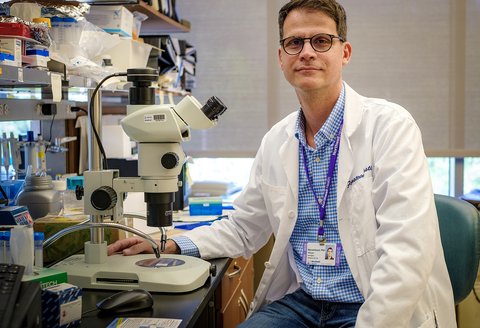Breast Cancer Drug Shows Promise for Treating Hereditary Hemorrhagic Telangiectasia, a Rare Vascular Disorder
05 November 2024 | Tuesday | News

Dr. Philippe Marambaud led the research published in Nature Cardiovascular Research. (Credit: Feinstein Institutes)
A drug commonly used to treat breast cancer might be able to help people living with hereditary hemorrhagic telangiectasia (HHT) – a rare genetic bleeding condition that causes enlargements and tangles of veins and arteries, as well as other malformations of the blood vessels – according to new research from The Feinstein Institutes for Medical Research. The study, which published in Nature Cardiovascular Research, also shows that HHT could cause certain cells in the endothelium of the blood vessels to multiply via a cancer-like mechanism of abnormal cell growth.
Philippe Marambaud, PhD, professor in the Institute of Molecular Medicine at the Feinstein Institutes, led the research that shows a specific process controlled by a protein called CDK6 is making endothelial cells multiply abnormally, directly linking to the blood vessel concerns seen in HHT. Researchers used drugs Palbociclib and Ribociclib, which are known to block the CDK6 protein in multiplying cancer cells and found that it stopped the abnormal cell growth in animal models with HHT who were not following normal growth patterns in their blood vessels.
“Currently, there is no treatment for HHT, a highly debilitating disease that affects more than 1.4 million people worldwide, and little is known about what happens at the molecular level,” said Dr. Marambaud. “However, these findings are a step towards better understanding the cause of HHT and how commonly used drugs could help patients living with it.”
Results from the study suggest that by targeting CDK6 with these drugs, doctors might be able to control the excessive cell growth in blood vessels seen in HHT – which could occur in the brain, lungs, digestive system, skin and other organs.
“Repurposing already approved medications that are proven to be safe and effective for one disease presents an opportunity to develop new therapies needed for vascular disease,” said Kevin J. Tracey, MD, president and CEO of the Feinstein Institutes and Karches Family Distinguished Chair in Medical Research. “Dr. Marambaud’s research is a step forward furthering our understanding of HHT and potential therapies.”
This research comes from a $3.6 million grant Dr. Marambaud received in 2018 from the National Institute of Health (NIH) to study repurposing of FDA-approved drugs to treat HHT.
Most Read
- How Health Systems Are Reshaping Drug Adoption, Partner Models, and Market Access in 2026
- Top 25 Biotech Innovations Redefining Health And Planet In 2025
- The New AI Gold Rush: Western Pharma’s Billion-Dollar Bet on Chinese Biotech
- Top 25 Biotech & Biopharma Leaders in Sustainable Innovation, 2025
- China’s Biopharma Dealmaking Surges in H1 2025, Driven by Record Licensing and Oncology Focus
- Chikungunya in China: How a “Forgotten” Arbovirus Found the Perfect Storm
- How Innovation Gaps in Biopharma Raise New Safety Concerns
- Smart Implants and the Future of Musculoskeletal Injury Treatment
- How Ethical Gaps in Psychiatry Could Undermine Biopharma Progress
- The Evolving Landscape of Women’s Health Innovation in the Asia-Pacific
- Using NLP-Driven Decision Support in Emergency Health Assistance
- Taiwan Steps Into the Global Spotlight With a New Cancer Therapy
- The Role of Unique Device Identification (UDI) in Tracing Medical Device Safety
- The Importance of a Patient’s Mental Health During Clinical Trials
Bio Jobs
- The State of Biotech and Life Science Jobs in Asia Pacific – 2025
- Avantor’s New CEO Ligner Aims to Unlock Global Potential and Deliver Shareholder Value
- AstraZeneca Commits $50 Billion to U.S. Expansion by 2030 in Biggest-Ever Global Investment
- Thermo Fisher, SAMRC, and South Africa’s Department of Science and Innovation Launch CATIR to Nurture Next-Gen Scientists
- Cube Biotech Appoints Former Sartorius CEO Dr. Joachim Kreuzburg to Board of Directors
- FDA’s AI Transition Marks a Turning Point in Drug Review: Industry Faces Pressure to Adapt Amid 20% Workforce Cut
- WuXi XDC Completes Mechanical Build of Singapore Bioconjugate Manufacturing Hub
News
Editor Picks











